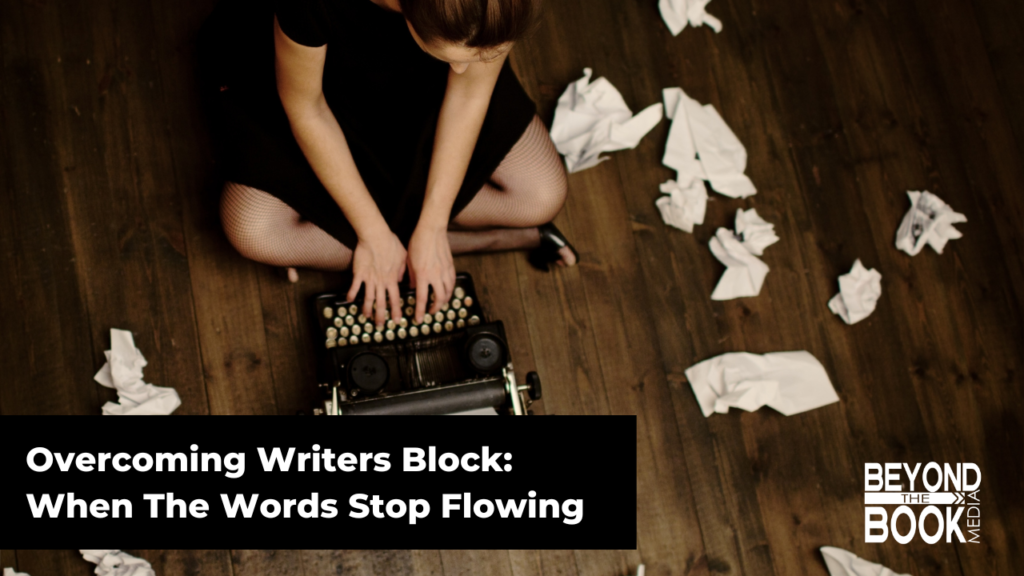Authors won’t let me lie, there’s nothing more frustrating than staring at a blank screen, waiting for the words to come… and nothing happens. You’ve got the idea in your mind, and the passion to tell the story, but when it’s time to put pen to paper (or fingers to keyboard), the words just won’t flow. Writer’s block is a challenge that almost every writer faces at some point, but what do you do when it feels like the words have stopped, and you can’t seem to find your way back?
The good news is that writer’s block doesn’t have to be the end of your creativity. In fact, it’s often just a pause — a moment of stillness before the words begin to flow again. The key is learning how to manage these moments, so you can keep writing, even when it feels difficult.

Understanding Writer’s Block
Before we get into the solutions, it’s important to understand that writer’s block is more than just “running out of ideas.” Often, it’s a symptom of something deeper. It could be rooted in fear — fear of not being good enough, fear of failure, or even fear of success. It might stem from perfectionism, where we pressure ourselves to create something flawless on the first try, leaving no room for mistakes or growth.
Sometimes, writer’s block can be a sign of burnout or fatigue, where our creative well has simply run dry because we’ve been pushing too hard without rest. Other times, it’s simply that our minds are overloaded, and we need to step back to regain clarity.
Recognizing the source of your block can be the first step toward overcoming it. Ask yourself: Is this block caused by fear, exhaustion, or something else? Once you’ve identified the root, you can take more targeted steps to break through.
Practical Steps to Break Through Writer’s Block
While there’s no one-size-fits-all solution, there are a few practical strategies that can help you get unstuck when the words won’t flow.
1. Change Your Environment
Sometimes, the simple act of changing your surroundings can help shake off creative stagnation. If you’ve been writing in the same spot for hours or even days, try moving to a new location. A coffee shop, a park, or even a different room in your house can offer a fresh perspective and a new burst of inspiration.
2. Write Without Judgment
One of the biggest roadblocks writers face is the desire to get it right on the first try. We want every sentence to be perfect, and every word to fit seamlessly into the narrative. But that kind of pressure can paralyze creativity.
Instead, give yourself permission to write badly. Let go of perfectionism and focus on getting words on the page, no matter how messy or disjointed they may be. You can always come back later to edit, refine, and polish. But for now, your only job is to write, even if what you write feels far from perfect.
3. Take a Break
It may sound counterintuitive, but sometimes the best way to move forward is to step away. If you’ve been staring at a blank screen for hours with no progress, give yourself permission to take a break. Go for a walk, do something creative that’s unrelated to writing, or simply rest. Often, when we give our minds space to breathe, the ideas we are searching for will naturally come to the surface.
4. Set a Timer
If you’re feeling stuck, try setting a timer for 10 or 15 minutes and commit to writing continuously for that short period of time. Don’t worry about what you’re writing or how it sounds; just let the words flow, even if they’re random thoughts. This technique helps quiet the inner critic and gets you into the habit of putting words on the page without overthinking.
5. Revisit Your “Why”
When the words aren’t flowing, it’s easy to feel disconnected from your writing. One powerful way to break through the block is to revisit your “why.” Why did you start writing in the first place? What inspired you to tell this story, write this book, or share this message? Tapping into the heart of your purpose can reignite your passion and remind you of the deeper meaning behind your work.
Nurturing Your Creative Well
Writer’s block can also be a signal that you need to take better care of your creative well. Creativity is like a muscle, and it needs rest and nurturing to stay strong. If you’ve been pushing yourself to produce without taking time to recharge, your mind might be telling you it’s time to step back and refuel.
Consider these ways to nurture your creativity:
- Read widely: Often, reading the work of others can spark new ideas and fresh inspiration.
- Engage in other forms of creativity: Paint, draw, listen to music, or engage in any activity that allows you to express yourself in a different way.
- Rest and reflect: Sometimes, writer’s block is simply your body and mind asking for rest. Give yourself permission to take time off without guilt, knowing that rest is an essential part of the creative process.
Trust the Process
Perhaps the most important thing to remember about writer’s block is that it’s temporary. It may feel frustrating at the moment but trust that the words will return. Creativity ebbs and flows, and just because you’re in a season of stillness now doesn’t mean your ideas or abilities are gone forever. The words will come back when you least expect it, often when you’ve allowed yourself the space and grace to recharge.
In the meantime, remember that you’re not alone in this. Every writer faces blocks, but those who succeed are the ones who keep going, even when it’s hard. Keep showing up, keep writing, and trust that your words will find their way back to you.






